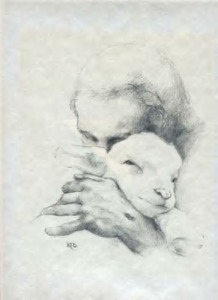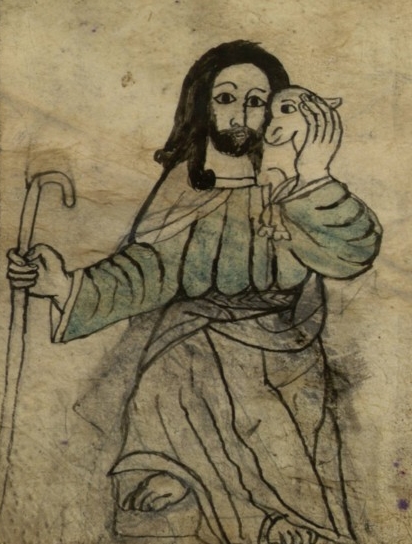“Rejoice with Me!”

Luke 15:1-10 (15:6-7) – September 11, 2022
Lost and found—this concept is very real and meaningful to my children. I have four children, and at various times, they have had to go looking for various possessions of theirs. You know, small items, things that were very precious to them somehow got lost. And oftentimes, they were persistent in looking for those precious things.
I can remember when my son was younger, probably in first grade. He had a favorite stocking cap he wore almost every day in the winter. He wore it to school, out to play, on the weekends, almost everywhere. And then one day it got lost. My son could not find it anywhere. He was heartbroken at the loss of this precious stocking cap—precious to my son, at least. We searched everywhere—and I mean everywhere—in the house, in the car, in his classroom, in his locker. He even looked in the lost and found at his school. Sadly, we never could find it.
Can you relate? Have you ever lost anything that was precious to you? Maybe not valuable in a monetary sense, but precious to you, your very favorite. Losing something precious can be quite a blow.
This is exactly what our Lord Jesus talked about in our scripture passage today. He tells the parables of the lost things. In fact, one nickname for this chapter, Luke 15, is the chapter of the lost things—the lost sheep, the lost coin, the lost son.
Our scripture reading today tells us about the lost sheep. We will leave the parable of the lost son, or the Prodigal, for another time and another sermon.
How precious was that sheep the shepherd lost? Let’s back up, and think about the parable our Lord told. He mentioned one hundred sheep belonging to this shepherd. One hundred sheep. A good-sized flock for one shepherd. And out of those one hundred sheep, one gets lost. We aren’t told how the sheep gets lost. The sheep could have done any number of typical things sheep do—sheep cannot just take care of themselves. This particular sheep could have wandered off, or lallygagged behind, or stubbornly gone its own way. We don’t know.
What we do know, from what Jesus said, is that the sheep is lost. Gone. Missing.
If a statistical analysis is done of this flock of one hundred sheep, what are some possible extenuating factors? Certainly, the rocky hills of much of the area and the subsistence-level terrain have a bearing on the well-being of the flock. And the difficulty of finding water can also be a factor. Statistically speaking, losing only one sheep out of one hundred is not much at all, not when the shepherd is dealing with such unfavorable conditions. From a loss prevention point of view, this percentage – one percent – of loss may very well be acceptable.
But this is not taking into consideration the plight of that one lost sheep. This individual sheep matters. This sheep is a creation of God. How does the lost sheep feel? Is the sheep scared? Lonely? Hungry? Injured?
This reminds me of my oldest daughter years ago, when she was just a preschooler. I was at a department store in Chicago with my two children (at that time), my older daughter just turned three, and my second daughter a baby in a stroller. I was looking at clothing on the round metal racks that are common to many department stores. And as I looked at clothing and tried to keep track of my toddler at the same time, she got lost. I could not find her, and she was much too small to see me over the clothing racks.
It only took me about four or five minutes of searching to discover where she had gone, but that time was anxious for me. And that time was traumatic for my daughter—I suspect those four or five minutes seemed to go on forever. She was lost. She did not know where she was, or where I was. And she was all alone, far from her home and familiar things, until I found her and reassured her that everything was all right.
Isn’t this similar to us? Isn’t this our situation, from time to time? You or I lose our way, get off track, slip and fall, or even stubbornly go our own way.
Periodically, I try to put myself into the scripture passage I’m considering. So, where am I in this scripture passage? Where are you? How do we fit in? Is this just a nice little story, or is there something more?
Theologian Howard Thurman reflects in his sermon on this passage, “Now, Jesus says that God is like the shepherd, seeking always to find those who are out of community with their fellows, and when they have found it, when they have found their community with their fellows, then all the world seems to fit back into place, and life takes on a new meaning. . . . The lost sheep. The searching shepherd. And the cry of anguish of the sheep was the voice of identification that the shepherd heard. That is how God is, if we let him.” [1]
But, how did Jesus see this parable? “Most often readers assume that they are the lost ones sought out by God and celebrate God’s persistence in finding them. But, Jesus told these stories to the Pharisees who were unhappy that Jesus was eating with known lost sinners.” (Remember, the Pharisees and other religious leaders were all part of the ‘in-crowd,’ the people who were really trying to follow God and God’s rules.) “Jesus’s message to them is that God is more interested in the lost than in them – and they should be too.” [2]
Jesus doesn’t just throw up His hands and forget about the lost ones. No! He goes after me, and you, searches for us, and makes sure that we are back with Him, in the place of security and protection, and says, “Rejoice with me! For I have found my sheep that was lost!”
Isn’t that good news? And the best part is, the Lord Jesus, the good Shepherd, is our good Shepherd, too. He cares about me, and He cares about each of you, as well. To me, the news about our good Shepherd is the best news in the world.
(Suggestion: visit me at my other blogs: matterofprayer: A Year of Everyday Prayers. #PursuePEACE – and A Year of Being Kind . Thanks!
[1] Howard Thurman, Sermons on the Parables, ed. David B. Gowler and Kipton E. Jensen (Maryknoll, NY: Orbis Books, 2018), 22–24, 25.
[2] http://worshipingwithchildren.blogspot.com/2013/08/year-c-proper-19-24th-sunday-in.html




